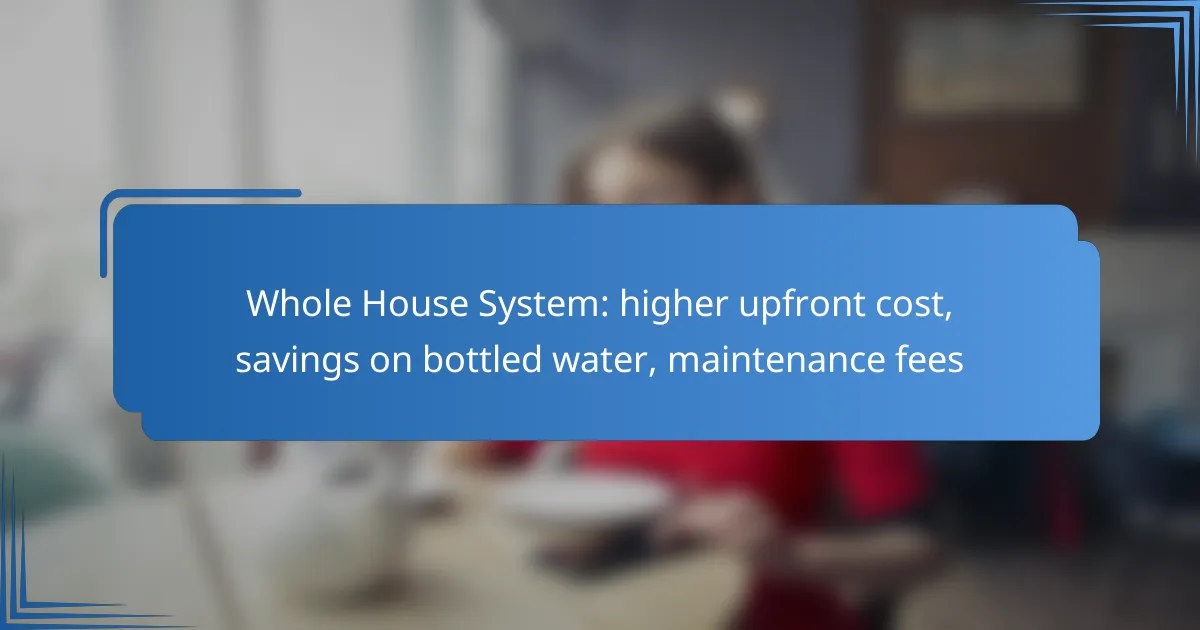Investing in a whole house water system may involve a higher upfront cost, often ranging from several hundred to several thousand dollars, depending on the system and installation complexity. However, this investment can lead to substantial savings by reducing the need for bottled water and minimizing plastic waste. Additionally, homeowners should consider ongoing maintenance fees, which include regular filter replacements and inspections, to ensure the system operates efficiently over time.
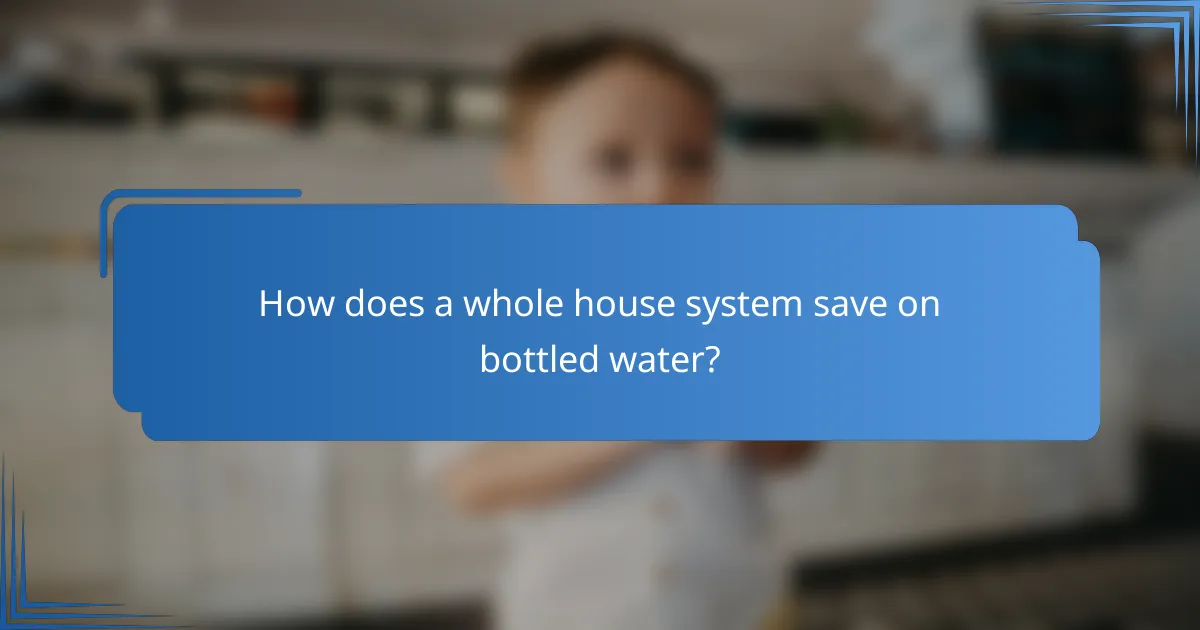
How does a whole house system save on bottled water?
A whole house water system can significantly reduce the need for bottled water by providing clean, filtered water directly from the tap. This system not only eliminates the cost of purchasing bottled water but also offers a sustainable alternative by reducing plastic waste.
Reduction in bottled water purchases
By installing a whole house system, homeowners can expect to cut down on bottled water expenses, which can add up to hundreds of dollars annually. Instead of buying cases of bottled water, families can enjoy unlimited access to filtered water directly from their faucets.
For example, if a household typically spends around $30 to $50 per month on bottled water, switching to a whole house system could save them approximately $360 to $600 each year.
Improved water quality for drinking
A whole house system enhances the quality of tap water, making it safer and more palatable for drinking. These systems often include multi-stage filtration processes that remove contaminants such as chlorine, lead, and sediment.
With improved water quality, families can feel confident in their drinking water, which can lead to healthier hydration habits and a reduced reliance on bottled alternatives.
Convenience of on-demand water
One of the key benefits of a whole house system is the convenience of having clean water available on demand. Homeowners no longer need to store bulky bottles or worry about running out of water.
This system provides an endless supply of filtered water for cooking, drinking, and other household needs, making it a practical choice for busy families. Additionally, it eliminates the hassle of transporting and disposing of empty bottles, contributing to a more efficient lifestyle.
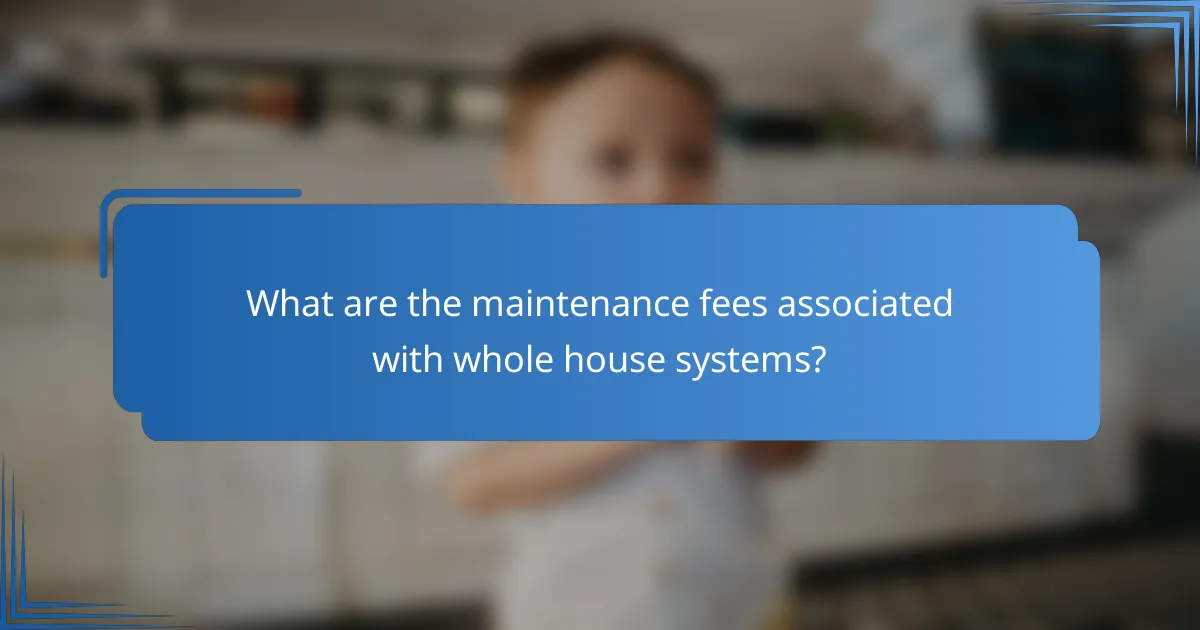
What are the maintenance fees associated with whole house systems?
Maintenance fees for whole house systems typically include costs for regular filter replacements, annual inspections, and potential repairs. Understanding these expenses helps homeowners budget effectively and maintain optimal system performance.
Regular filter replacements
Whole house systems require filter replacements at regular intervals to ensure water quality and system efficiency. Depending on the type of filter, replacements may be needed every 6 to 12 months. Homeowners should budget around $50 to $200 annually for these replacements, depending on the system’s complexity and filter type.
To minimize costs, consider purchasing filters in bulk or subscribing to a filter replacement service that offers discounts. Regularly checking filter status can also help avoid premature replacements.
Annual system inspections
Annual inspections are crucial for maintaining the functionality of whole house systems. A professional inspection typically costs between $100 and $300, depending on the service provider and system type. These inspections can identify potential issues early, preventing costly repairs down the line.
Homeowners should schedule inspections at the same time each year to establish a routine. Keeping records of inspections can also help track system performance and maintenance history.
Potential repair costs
Repair costs for whole house systems can vary widely based on the nature of the issue. Minor repairs may cost around $100 to $300, while major repairs could reach $1,000 or more. Factors such as system age and the availability of parts can influence these costs.
To mitigate unexpected repair expenses, homeowners should consider setting aside a maintenance fund. Regular maintenance and prompt attention to issues can also help reduce the likelihood of costly repairs.
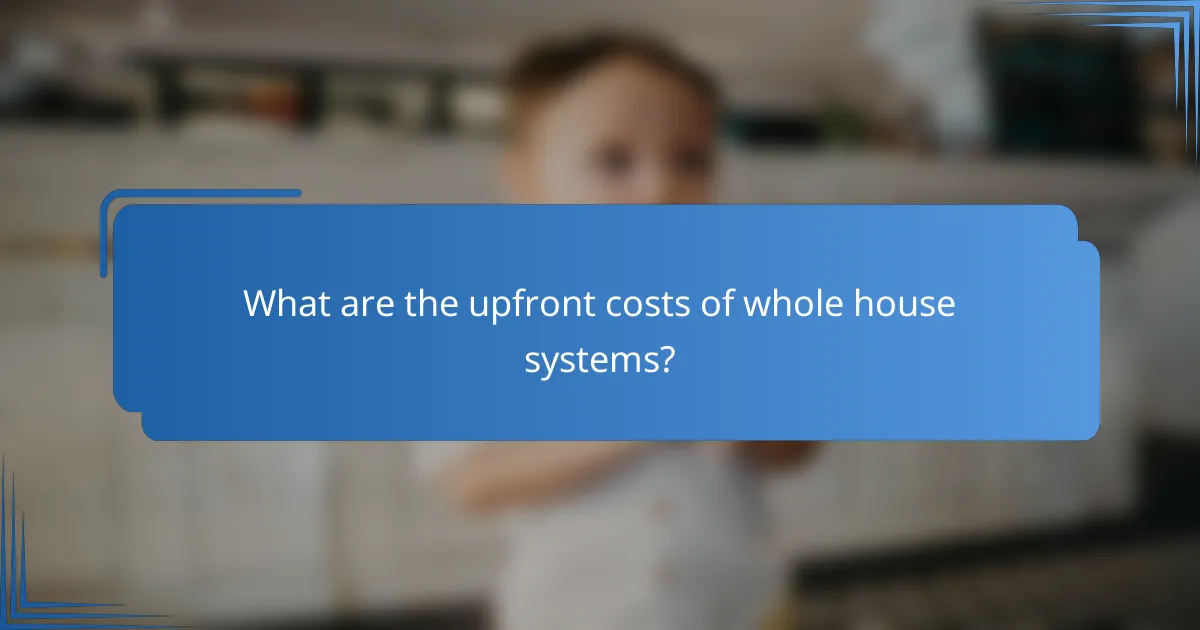
What are the upfront costs of whole house systems?
The upfront costs of whole house systems can be significant, often ranging from several hundred to several thousand dollars depending on the system type and installation complexity. These costs typically include installation fees, equipment, and materials, which can vary based on local market conditions and specific requirements.
Initial installation expenses
Initial installation expenses for whole house systems can vary widely. Homeowners may expect to pay between $1,000 and $5,000 for professional installation, depending on the system’s complexity and the size of the home. It’s crucial to obtain multiple quotes from licensed contractors to ensure competitive pricing.
Additionally, some local regulations may require permits, which can add to the initial costs. Always check with local authorities to understand any necessary compliance requirements before proceeding.
Cost of equipment and materials
The cost of equipment and materials for whole house systems can range from a few hundred to several thousand dollars, depending on the type of system chosen. For instance, water filtration systems may cost between $500 and $2,500, while more advanced systems, like reverse osmosis or whole house softeners, can exceed $3,000.
When budgeting, consider not only the initial purchase price but also the quality and longevity of the equipment. Investing in higher-quality materials may lead to lower maintenance costs over time.
Financing options available
Financing options for whole house systems can help manage the upfront costs. Many homeowners choose to finance through personal loans, home equity lines of credit, or specialized financing programs offered by manufacturers and contractors. Interest rates and terms can vary significantly, so it’s essential to compare offers.
Some companies may also provide promotional financing options, such as zero-interest plans for a limited time. Be sure to read the fine print and understand the total cost of financing before committing to any agreement.
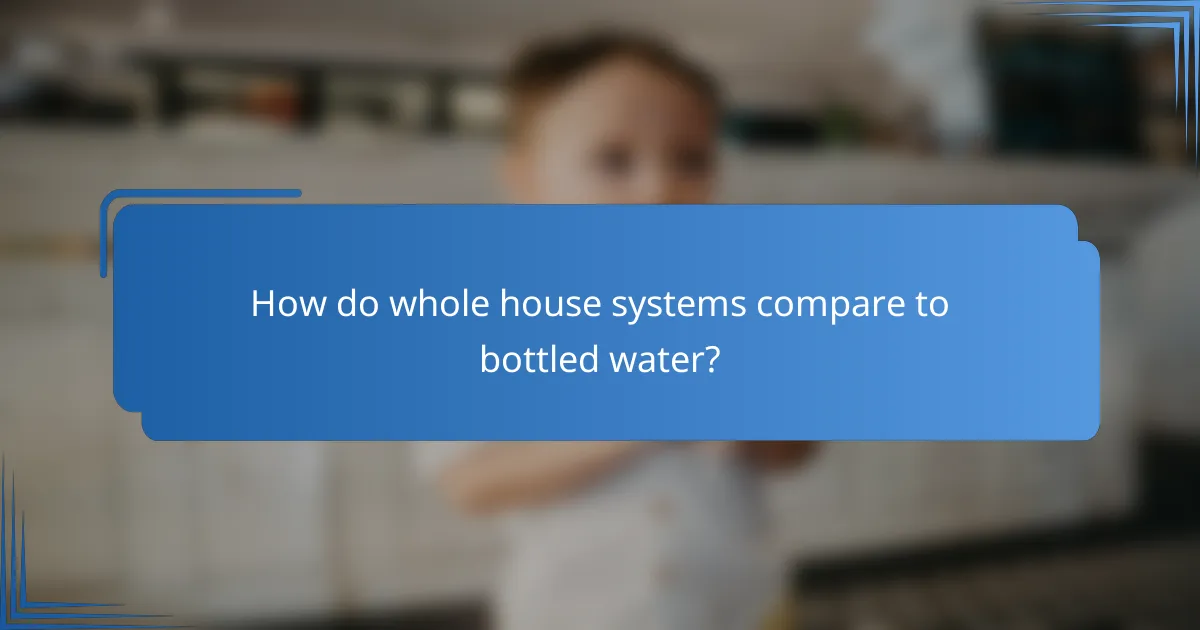
How do whole house systems compare to bottled water?
Whole house systems provide a comprehensive solution for water filtration, often leading to significant savings compared to purchasing bottled water. While the initial investment may be higher, the long-term benefits in terms of cost and convenience can outweigh the upfront costs.
Cost-effectiveness over time
Investing in a whole house system typically involves higher upfront costs, ranging from hundreds to a few thousand dollars, depending on the system’s complexity. However, over time, these systems can save homeowners significant amounts on bottled water purchases, which can add up to several hundred dollars annually.
Consider that a family consuming bottled water regularly may spend anywhere from $200 to $600 each year. In contrast, a whole house system can eliminate or drastically reduce this expense, making it a financially sound choice in the long run.
Environmental impact considerations
Whole house systems contribute positively to environmental sustainability by reducing the reliance on single-use plastic bottles. This shift can significantly decrease plastic waste, which is a growing concern globally.
Moreover, many whole house systems are designed to be more efficient, using less water than traditional methods of filtration and purification. This efficiency not only conserves water but also minimizes the carbon footprint associated with transporting bottled water.
Water taste and quality differences
Whole house systems often enhance water quality by removing contaminants and improving taste, which can be a notable improvement over tap water. The filtration process can eliminate chlorine, sediment, and other impurities, resulting in cleaner, better-tasting water.
In contrast, bottled water varies widely in quality and taste, depending on the source and brand. Some bottled waters may contain added minerals for flavor, while others may not meet the same filtration standards as a whole house system, leading to inconsistencies in quality.

What factors should be considered when choosing a whole house system?
When selecting a whole house system, it’s essential to evaluate water quality needs, system capacity requirements, and local water supply conditions. These factors will help determine the best system for your household, balancing upfront costs with long-term savings and maintenance considerations.
Water quality needs
Assessing your water quality needs is crucial for choosing an effective whole house system. Consider the specific contaminants present in your water supply, such as chlorine, lead, or sediment. Testing your water can provide insights into necessary filtration or treatment methods.
For example, if your water has high levels of chlorine, a carbon filter may be required. Conversely, if heavy metals are a concern, a reverse osmosis system might be necessary. Understanding these needs will help you select a system that effectively addresses your water quality issues.
System capacity requirements
System capacity refers to the amount of water a whole house system can treat effectively. It’s vital to choose a system that meets your household’s daily water usage, which can vary widely based on family size and lifestyle. A typical household may require a system that can handle anywhere from 10 to 20 gallons per minute.
To determine the right capacity, consider peak usage times, such as during morning routines or when multiple appliances are in use. Selecting a system with adequate capacity ensures that you won’t experience low water pressure or inadequate filtration during high-demand periods.
Local water supply conditions
Local water supply conditions can significantly impact the performance of a whole house system. Factors such as water hardness, temperature, and source (well vs. municipal) can dictate the type of system you need. For instance, hard water may require a water softener to prevent scale buildup in pipes and appliances.
It’s also important to consider any local regulations regarding water treatment systems. Some areas may have specific requirements for installation or maintenance that could affect your choice. Understanding these conditions will help ensure compliance and optimal performance of your system.

What are the long-term benefits of investing in a whole house system?
Investing in a whole house system offers significant long-term benefits, including reduced reliance on bottled water, lower maintenance fees, and increased home value. While the upfront cost may be higher, the savings and convenience over time can outweigh this initial investment.
Increased home value
A whole house system can enhance your property’s market appeal, leading to a higher resale value. Potential buyers often view such systems as a valuable upgrade, especially in areas where water quality is a concern.
Investments in water filtration systems can yield returns of around 10-15% on your home’s value, depending on the local real estate market. This makes it a practical consideration for homeowners looking to improve their property’s worth.
When considering a whole house system, ensure it meets local regulations and standards. Systems that comply with safety and quality benchmarks are more likely to attract buyers and justify a higher price point.
